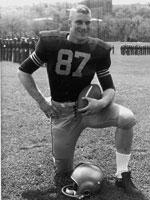Bill Carpenter
 |
|
| Date of birth | September 30, 1937 |
|---|---|
| Place of birth | Springfield, Pennsylvania |
| Career information | |
| Position(s) | End |
| Height | 6 ft 2 in (188 cm) |
| Weight | 210 lb (95 kg) |
| College | Army |
| High school | Springfield High School |
| Career history | |
| As player | |
| 1957–1959 | Army |
| Honors | 1959 consensus All-American |
| Military career | |
| Allegiance |
|
| Service/branch |
|
| Rank |
|
| Battles/wars | Vietnam War |
| Awards |
Distinguished Service Cross Silver Star |
William Stanley "Bill" Carpenter, Jr. (born September 30, 1937) is a retired American military officer and former college football player. While playing college football at the United States Military Academy, he gained national prominence as the "Lonesome End" of the Army football team. During his military service in the Vietnam War, he again achieved fame when he saved his company by directing airstrikes on his own position. For the action, he was awarded the Distinguished Service Cross.
Carpenter. was born to William Stanley Carpenter, Sr. (1907–1945) and Helen Carpenter (née Sparks). Private First Class Carpenter, Sr. served in the U.S. Army as an ammunition bearer in the 393rd Infantry Regiment, 99th Infantry Division and was killed in action in the Ruhr Pocket. He is interred in Margraten, Netherlands at the Netherlands American Cemetery. Helen remarried and relocated the family to the Philadelphia area.
He was a 1955 graduate of Springfield High School, Springfield, Pennsylvania and later attended the Manlius School (now Manlius Pebble Hill School) in Manlius, New York.
Carpenter married Toni M. Vigliotti in 1961 and had three children: William S. Carpenter III (1962), Kenneth Carpenter (1964), and Stephen Carpenter (1965).
While attending the United States Military Academy at West Point, Carpenter played as a split end on the football team, alongside Heisman Trophy-winning halfback and fellow combat infantryman Pete Dawkins. Carpenter earned the nickname the "Lonesome End" as a result of the team's tactic of aligning him near the far sideline and leaving him outside of huddles. He played on the undefeated 1958 West Point team, and in 1959, while team captain, was named an All-American. Legendary Army head coach Earl Blaik, who spent twenty years on the Army coaching staff, called Carpenter "the greatest end I ever coached at West Point."
...
Wikipedia
